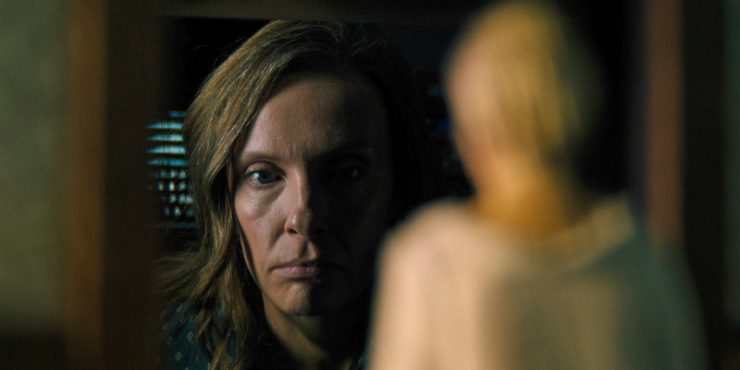I guess that Hereditary is good. Across the board, it seems to be executing its plan as fully and exceptionally as it wants to. It’s lead by a performance by Toni Colette that might be amongst the most powerful things the veteran actress has ever done. It’s the kind of performance that – if it weren’t in a horror movie – would garner serious Oscar attention. Writer-director Ari Aster makes his feature debut here (after a bevy of short films), and he pays great homage to the horror movie genre. He casts a wide net, tipping his hat to ghost stories, gore-fests, and twisted, psychological thrillers. The movie opens on a family memorializing their maternal grandmother. Colette plays Annie Graham, the mother and the architect of miniature dioramas displaying the sadness and mundanity of her everyday life. Her artwork seems to be in high demand, but the death of her mother derails her progress. Seen only in photos, Annie mother is described as intensely private and domineering. She haunted Annie and her family while she was alive with illness both physical and mental, and in death she doesn’t appear to be quite finished.
Annie lives in a multi-roomed cabin that seems isolated in the woods of Middle America. She lives with her husband, Steve (a strong Gabriel Byrne), a patient, supportive man fiercely committing to a solidity to balance the recent tragedy. Her son, Peter (Alex Wolff), is a detached, teenaged pothead who spends his school days staring at his crush, while her younger daughter, Charlie (Milly Shapiro), is the kind of unsettling, expressionless child these movies love to showcase. Annie’s reaction to her mother’s death is complicated. The woman’s role in numerous catastrophes throughout Annie’s life dramatizes her death – it’s practically a relief. The person closest to the grandmother was Charlie. Already struggling to interact with people, either her own age or otherwise, the death of her grandmother sends Charlie into further isolation, her odd behavior becoming even more alienating. When the Graham family is confronted with another, more ferocious tragedy, things begin to unravel, and Annie’s already fragile construction begins to fall apart.
The Grahams get continuous visits from various apparitions, which leads Annie to talk to Joanie (Ann Dowd), a fellow bereaved woman who meets her at a support group. She introduces Annie to the concept of being a spirit medium, to various rituals that can bring her in conversation with her dead relatives. Skeptical, Annie still begins practicing, only to learn that not all spirits are happy to be brought back. Aster knows his horror movie constructs, and he places them throughout to highlight his impeccable talent behind the camera. An eerie, abnormally large tree house sits watching the Graham family home. A smaller home, watching the actual home which is also filled with Annie’s various even smaller homes. The claustrophobia in this adds to Aster’s perpetual unsettling mood which he constructs in fierce smash cuts and an incredibly tense music score (by Colin Stetson). I think Aster’s sharp filmmaking style is so confident, so assured. There’s never an unattractive beat throughout, and neither are we ever greeted with a moment of comfort or relief. Even the seemingly pleasant conversations between Joanie and Annie are shot awkwardly through care windows or in the glare of the sun.
Hereditary‘s main export is probably dread. It thinks up some truly horrific scenarios and asks its cast to respond to them naturally, as opposed to the usual histrionics of the genre. The film’s victims aren’t copulating teenagers, greedy rich men or sadists. The Grahams are normal people, complicated but otherwise unremarkable. They are besieged by event after event that would likely crush the spirit of any family. It’s not exactly shocking that they might go to pieces, but Hereditary never seems to calm down, never seems to let them take their breath before another traumatizing experience befalls them. This is where Colette comes in. Her portrayal of loss, guilt and distrust are the motor that moves this movie along. Her performance is imperative to the sustaining dreariness that Aster wants to employ. Flanked by Byrne, Wolff and Shapiro, her pain is reflected and refracted, but it always comes back to her grief and her unyielding pain. Colette has always been a treasure but I don’t know if I’ve ever seen a movie ask this much of her. She delivers, as she always does, and helps Aster make Hereditary the kind of movie that sticks in your soul for days.
This movie fully informed me on my own distaste for the horror movie genre. The rigidity of horror’s structures inherently places its films into a competition, and a degree of one-upmanship arises between filmmakers looking to up the ante. But their resources are the fundamentals of human suffering. Hereditary plays with ideas of grief and tragedy that are excruciatingly real, but it has no comment or analysis that I can see. These ideas are purely pawns in Aster’s cinematic trick, the canvas for his masterpiece. Once the film starts to dip its toes into matters of the occult, it feels not only too late, but an unwelcome cop-out. A way to explain: I’m showcasing these awful, awful feelings but Hey, it’s just a Ghost Story. I felt pummeled by the precision with which Aster tells his unnerving story, resentful of the fact that I have little recourse to call it ‘bad’ because the writer-director has covered his bases on the screen. It’s inside-baseball approach to horror moviemaking isn’t for everybody, and I walked out feeling like it isn’t particularly for anybody.
Written and Directed by Ari Aster










